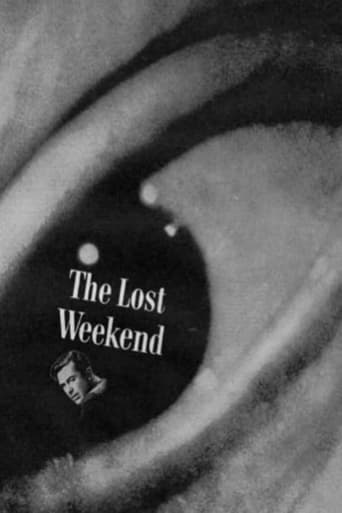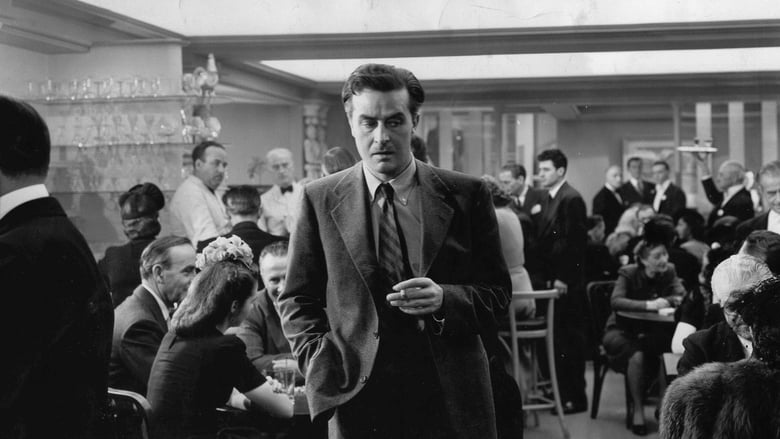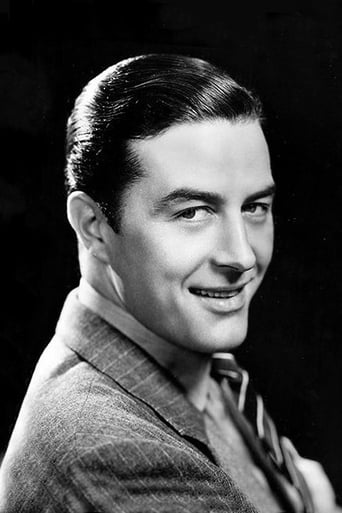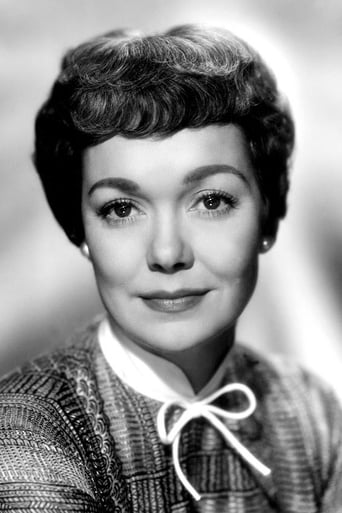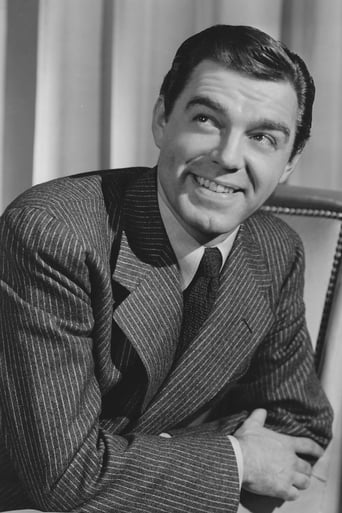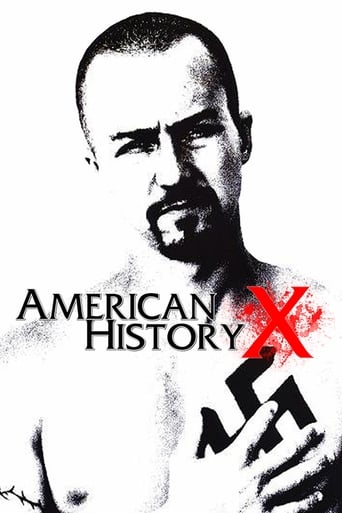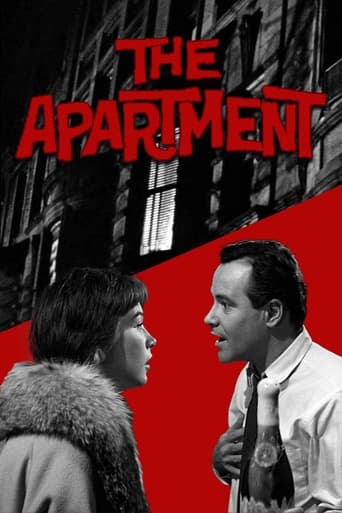The Lost Weekend (1945)
Don Birnam, a long-time alcoholic, has been sober for ten days and appears to be over the worst... but his craving has just become more insidious. Evading a country weekend planned by his brother and girlfriend, he begins a four-day bender that just might be his last - one way or another.
Watch Trailer
Free Trial Channels
Cast


Similar titles
Reviews
not horrible nor great
Most undeservingly overhyped movie of all time??
This is one of the few movies I've ever seen where the whole audience broke into spontaneous, loud applause a third of the way in.
Mostly, the movie is committed to the value of a good time.
Having apprehended the précis of what the film is about, one's knee-jerking question might be, what is the allure of watching a congenital soak drinking himself to stupor over a weekend's spell if the viewer is fortunate enough not being subjugated under such a distasteful spell? Surely Billy Wilder's THE LOST WEEKEND, a prestigious Hollywood classic and Oscar's BEST PICTURE winner, can dissipate this nagging doubt, because alcoholism is just one of many a jones scourging our human race, more or less, everyone can find some connection with the story, and Wilder sensibly attest that the battle cannot be won without the cooperation of own's volition and the external succor. Ray Millard plays a New York writer Don Birnam, driven by his execrable addiction to the brink of self-destruction, and Mr. Millard's Oscar-winning performance is a tour-de-force with a capital T. It is a daunting task a priori, Don is not necessarily a character who can rally audience's compassion prima facie, a coward he is, indeed, shirking from a resolution of fighting back, apparently he doesn't deserve redemption, not least a virtuous girlfriend like Helen St. James (a saintly Wyman), who has been nothing but supportive for three years by his side. Don's ordeal is a vicious circle which he has no strength to shuck off, Mr. Millard viscerally points up his painful struggle, poignant self-pity, undignified resignation (when he deigns to pilferage, scrounge and coercion on multiple occasions to slake his craving), plus a vestigial ghost of hope through the utter misery shrouding Don's downward spiral. Maybe we shouldn't root for Don after all? It is not hard to conjecture Mr. Wilder's would stick to his gun until the finale (as in his pièce-de-résistence ACE IN THE HOLE 1951), since Don's ominous undoing is primed like such an inexorable force rushing in the homestretch, to a certain point, it even seems audience would be okay with a totally tragic denouement in this cautionary tale, which actually makes the far too convenient magic cure near the finish-line feel contrived and compromised, a quibble might be deemed as a blemish on the film's otherwise intact integrity, again, it is not the happy ending per say which rouses one's demur, but is the wholesome process how that ending is presented. In this case, it is unsatisfactory by half. Visuals-wise, Wilder tactfully interlaces some expressionist panache onto the movie's monochromatic sheen, the most striking specimen is the moment when Don is temporarily locked up inside a drunk ward (where Frank Faylen makes an impressive cameo as a male nurse), the horror and despair does creep against the shadows of iron bars and its aural cacophony into a spectator's core, not to mention the bat-assaulting-rat figment in Don's delirium later, burnished by Miklós Rózsa's nightmarish and eerie string score, which, sometimes, is truly unsettling as our sonic cues of inner-anguish and self-abandonment. There is irony too, the "Champagne Aria" from LA TRAVIATA which tantalizes Don's thirst is a hoot, so is Don's desperate attempt to hock his typewriter on the day of Yom Kippur, for all its intents and purposes, THE LOST WEEKEND is a transfixing social critique in its essence, but laden with some less savory footnotes, for instance, that game-changing kiss sweeping Gloria (Dowling) off her feet is so damn an exemplar of male wish-fulfillment, Wilder and his screenwriter Charles Brackett should've known better, no well-adjusted woman could enjoy a moribund man's booze- macerated kiss, not even it is from someone who is as good-looking as Mr. Millard, that is what this reviewer can vouch for.
You'd love to write off The Last Weekend. "Oh, another of those 40s 'social issues' pictures, fraught with contrived scenarios, posturing affectations instead of performances, and a gentle, comforting blanket of artifice throughout." You watch it, and chortle to yourself that it's done well enough for the time, but cute, and showing its age. You, you think, chest puffed, have weathered Requiem for a Dream, Trainspotting, Leaving Las Vegas and more. This quaint 1940s addiction drama won't leave much of a mark on you.You'd love if that were all true.Then it hits you. The film ended 15 minutes ago, and you're still staring down at the floor, in a numb, foggy daze. Every time you close your eyes, you're ravaged by visions of bats crawling out of the walls drooling streaks of blood, or enigmatic, overlapping rings of liquid, like the Olympics emblem turned aquatic pentagram. You hum tunelessly to drown out the frenzied, feral screeches of a sanitarium at night. Your stomach turns at the thought of snapping yourself out of it with a stiff...drink.The high, the haze, of Billy Wilder's masterpiece have worn off. Welcome to the hangover. You let the sordid weight of the picture cascade over you over and over again, like waves dissolving a sandy shoreline to nothingness. You gulp back sin and regret. And, feverishly, you remember. You remember Billy Wilder, coughing up a lung blacker than any noir tryst here. He takes a pot shot towards melodrama and horror movie, and, in the gutter between, hits jackpot. It's a simple story of a simple addiction, taking wonderful, terrible flight in the trace details, with every second shot lined with liquor bottles looming like tombstones, or cascading from the ceiling light fixture like a Bat-signal of blissful betrayal. If you'd gone drink-for-drink with Don Birnham, you muse, you'd have been dead before the first third. And you say a silent prayer for the countless real-life Don Birnhams who have tried and succeeded. You remember that script - too raw, too honest, to not be gutted from the shameful autobiography of its writer, Charles Jackson, who understood the conniving, the ingenuity, the bargaining, bartering, begging, and gamut of lawbreaking rationalized away in the Sisyphean quest for another drink all too well. That pace - creeping indiscernibly from early pleasantries, the eloquent, airy monologues, the guilty laughs, into a steadily tightening vice of claustrophobic, fatalistic despair. The shame of being caught in an unthinkable act, and braying "This isn't me!" more to yourself than your abhorring audience. A lurch all too familiar to those who have added their own barrage of vicious circles to the local watering hole's table top. And that bit where it all goes black, though this sleep has only swirling nightmares to offer. You remember that theremin - more eerie here than any of its usual otherworldly creature feature companions by being as distressingly real as they are reassuringly false. And you remember Ray Milland, all right. Too charming a firebrand not to love, too weaselly, willfully self-destructive not to loathe. He seduces and betrays us and himself over, and over, and over again, and over, and over, and over again we crawl back to him, entranced by his flashing, manic eyes, his glib, sharp tongue, and his crumpling of the deepest ebb of despair. We spare a thought for Jane Wyman, resiliently chipper in the face of a black hole, Philip Terry, charm dulled into flat affect by relentless disappointment, and Howard Da Silva, the warmly roguish angel and devil on the shoulder at once. But it is Milland's ghoulish face, leering like Norman Bates yet pleading like one of his victims, that you fight to expunge from your pounding skull. And is it all a nightmare, to be shaken awake from by a deus-ex-typewriter Hays Code ending as disingenuous as it is jarringly chirpy? Or is this merely another red herring, with another liquor bottle always dangling out the window, or behind the book case, biding their time until the despicably opportune moment presents itself? Only time will tell. But, let's not forget that a circle is the perfect geometric shape. No end. No beginning. One thing is indisputable: whether you bury it fearfully or binge it with the unquenchable ferocity of a Don Birnham, you'll never forget this Lost Weekend. You'll try. But you won't. Delirium is a disease of the night, my friend. Goodnight. -9/10
From an opening sequence not unlike the opening moments of Alfred Hitchcock's PSYCHO 15 years later to the bloody bat-eats-rat moment, THE LOST WEEKEND teeters on the verge of outright Horror- which is as it should be: I've spent the better part of my life babysitting drunks and addicts and it IS a Real Life Horrorshow, no doubt about it. (If anything, THE LOST WEEKEND is a relatively TAME depiction of alcoholic addiction.) I had a Mother, but no Father (HE loved one thing, and one thing only: The Bottle, which comforted him and laid him to rest and took him away from Life and all its responsibilities). "Drink responsibly" is an oxymoron you seldom hear any more; like any addiction, alcoholism is a self-inflicted malady, so it's hard to feel sympathy for the hardcore Drunk (at least, it is for ME). In my entire life, I've never seen so much untapped potential wasted as when someone takes up The Bottle (or drugs). Remember always: "Denial is NOT a river in Egypt."
Possibly the first Hollywood film to treat alcoholism in anything resembling a serious realistic way. The film is almost has a sense of an Orson Welles's an uncompromising look at the devastating effects of alcoholism. Directed by Billy Wilder, and based on Charles R. Jackson's 1944 novel of the same title, 'the Lost Weekend' recounts the weekend life of an alcoholic writer, Don Birnam (Ray Milland) where he went on an extreme alcoholic binge. Ray Milland is just the right actor for the job as he really gives out the character willing to do almost anything for a drink. It was no surprise, that he won Best Actor at the Academy Award in this role, that year. What makes the film so gripping is the way, Billy Wilder shot the film. I love the opening & closing shots of the city. Billy Wilder made great use of John F. Seitz's cinematography camera-work. The scene where Don Birnam is frantic looking a pawn store to sell his typewriter along Third Avenue in New York City on Yom Kippur has this sense of neo-realist morceau d'anthologue to it. You see this copy or reused in other films, where the character walking toward the camera as neon signs pass by camera effect. The drab, gritty black and white cinematography of the expressionistic film emphasized the frightening, twisting, and harrowing power of alcohol. The way, the black and white works on shadows gives it an expressionistic film noir style look. The way, the small bottle appear big in the lamp is a great use of illusion. Some of the booze-soaked scenes were shot through or in the presence of bottles, given a warp illusion of human figures. The way, he shot the staid rings of the shot glasses was great. I love the speech, Birnam gives to the bartender, not to wipe it. The enclosing rings is a symbol of the depth of his drunkenness; little vicious circle. By not wiping it, it will continue to go around and around with no end, no beginning. No end, no beginning. That's how Birnam wants it. While, some people might not his story due to his unlikable; the way, Ray acts makes the film, a little bit more charming, sucking you into the story, more and more. The film's musical score by Miklós Rózsa was among the first to feature the theremin, which was used to create the pathos of alcoholism. It's chilling, and reminds me more a tune to an old school classic horror movie, than anything drama relate at the time. The bat and the mouse scene is a lot scarier than some of these modern day horror movies. That really make the silly notice of pink elephants, scary right there. Wilder was originally drawn to this movie due to his recovering alcoholic screenwriter friend Raymond Chandler who fell off the wagon during the filming of 1944's Double Indemnity. Wilder made the film, in part, to try to help Chandler. The story is well-written with crafty dialogue. I love the whole river Nile speech. I like how Gloria (Doris Downling) cheapens herself by shortening her words with abbreviations. It's a way to say, symbolism how cheap she became as a call girl. I also love how very accurate, the film is to the book. The only different is that novel pointed to a homosexual affair as the root of Birnam's troubles; the film version replaced it with writer's block. I guess, talking about homosexuality was still a little bit more taboo than talking about alcoholism, back then. The pacing is great. Still, I found the Opera flashback to be a bit odd. If Don didn't like the opera, why did he go in the first place? Perhaps the only thing saving Don was girlfriend Helen St. James (Jane Wyman), a selfless and incorruptible woman who tolerates his behavior out of love. Helen still seems to be one-dimension, manic pixie dream girl who hasn't nothing else to do besides help Birnam with his life. Doesn't she has a job as an editorial researcher at Time Magazine or not? Helen does, however, tells him with the words, 'while he trying to stop drinking, she is trying hard not to love him'. One other different from the book is the ending. Although it's somewhat unconvincing, rehabilitative 'happy ending' conclusion. The film did had a more optimistic, upbeat and hopeful than the one in the novel. I thought the film ending was ominous and so true of anyone struggling with addiction in that one never really knows if he has really kick the habit or not. Anybody who knows or is dealing with alcoholism should at least, watch this film. When this movie came out in 1945, the liquor industry tried to sway Paramount from releasing the film, allegedly even going as far to bribe Billy Wilder for the negatives remove it from circulation. On the other hand, the more traditional folks tried to keep it from release for fears it would encourage drinking. The film had enormous impact, especially upon returning combat-fatigued GIs from WW II who were adjusting and struggling with their own difficulties in civilian life and often turning into alcohol dependents. In fact, its success spurred further black and white, post-war dramas dealing with social-problems. While the film hasn't aged well due to the number of scratches and mark abrasion, and some people might not find watching a black and white film, attractive. I have to say, a color film like 2012's Flight couldn't give us the depth, this film does. The film did great a poor DVD transfer and here's hoping they get together to properly restore both the sound and especially the picture quality of this classic film. I felt that this was a great movie with a great script, great acting, great directing and hence overall an excellent work of art with a very good message about life.

